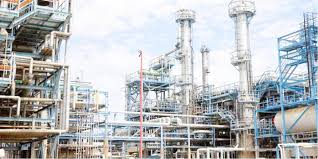Local refinery currently meets 50% of daily petrol consumption – NMDPRA
The Nigerian Midstream and Downstream Petroleum Regulatory Authority (NMDPRA) has disclosed that local refinery only meets 50 per cent of daily fuel consumption, justifying the continued importation of Petroleum Motor Spirit (PMS) to meet the shortfall. NMDPRA also dispelled information making in the social media that the colour and quality of PMS by some marketers […]

porth refinery
The Nigerian Midstream and Downstream Petroleum Regulatory Authority (NMDPRA) has disclosed that local refinery only meets 50 per cent of daily fuel consumption, justifying the continued importation of Petroleum Motor Spirit (PMS) to meet the shortfall.
NMDPRA also dispelled information making in the social media that the colour and quality of PMS by some marketers are inferior, describing the claims as bogus and unscientific.
Speaking at a special briefing yesterday, Executive Director, Distribution, Systems, Storage, and Retailing Infrastructure of NMDPRA, Ogbugo Ukoha, said: “Just before the current administration came in. The daily PMS supply sufficiency was always in excess of 60 million. “In fact, averaging about 66 million a day for PMS. And following Mr. President’s withdrawal of subsidy, the announcement of May 29th, 2023, we immediately saw a steep decline in consumption. And between then and as we speak, we’ve continued to do plus or minus 50 million.
“Of these 50 million litres averaging for each day, less than 50% of that is contributed by domestic refineries. And so the shortfall in accordance with the PIA is sourced by way of imports.”
- NIGERIA DAILY: How Tuition Fee Poses Threat To Female Education
- Nigerian farmers have been victimised — Obasanjo
The ED disclosed that none of the Oil Marketing Companies (OMCs) that own refineries in the country for this year have imported any PMS.
The other OMCs are the ones that are importing the shortfall. And if we did nothing to bridge that shortfall, we will have scarcity in our hands.
He said: “So just for clarity, what I’m saying is that the contribution of local refineries towards the sufficiency is less than 50%. Currently, between January and February, 2025, is less than 50% of what we require daily.”
Speaking to product quality, he said before any product is distributed in Nigeria, the regulator ensures that from the load ports of the products, whether from a domestic refinery or imported from outside the country, accredited laboratories must test every product and duly issue certificates of quality to say that the products that is laden in the vessel meets those specifications.
Okoha said: “Colour, for instance, real terms, doesn’t have any quality impact. But the sun specification requires every product to have a color for differentiation. The only color in the current specification that is colorless is the ATK.
“So it enables from visual, just sighting of the product, for you to tell that this is PMS, because it complies with the color, separate from AGO.
“But it’s important that people who dabble within the social media space are reminded that it’s actually disrespectful if you imagine that Nigerians are gullible. Nigerians are discerning enough to know that energies need to be directed positively.”
